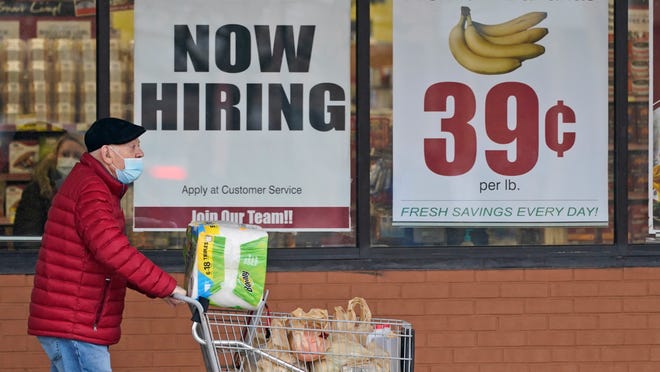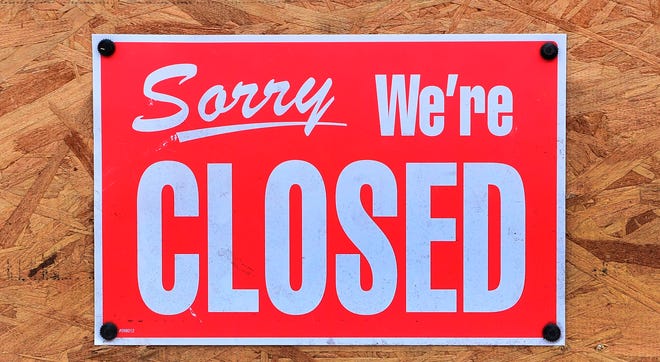[ad_1]
Brandon Boyd was furloughed from his communications jobs for an events company in March and then permanently laid off November, making him a little nervous, especially with his jobless benefits set to expire within weeks.
“It kind of put me in scramble mode,†says Boyd, who lives in Erie, Pennsylvania. “I’m 29 and filing for unemployment.â€
But it took Boyd just a month to draw two offers, and he accepted a position as marketing coordinator for Mercyhurst University. While it pays about $4,000 a year less than his old job, he’s offsetting that gap with free online classes at the school that will allow him to earn a Master’s degree. He’s also benefiting from other career development opportunities.
“It’s going to end up being better for me,†he says.
New Frontiers:Nissan pickup totally redesigned for first time in 17 years
Less 150s:Parts shortage plagues F-150 production; Ford cuts more shifts in Dearborn, Kansas City
How’s the job market?
The U.S. economy is far from healed from the effects of the COVID-19 pandemic, with about 10 million of the 22 million Americans who lost their jobs during the crisis still unemployed. The Labor Department on Friday is expected to report 70,000 job gains in January following 140,000 losses the prior month.
But the labor market is also showing impressive resilience, at least in some industries. Many permanently laid-off workers are finding new jobs and often for more pay and at higher levels than their previous positions, according to a recent survey by Skynova, which provides online invoicing services for businesses.
“There’s a fairly large segment of the economy that felt very little effects from the pandemic, and even if it did, it recovered pretty swiftly,†says economist Dante DeAntonio of Moody’s Analytics.

Sixty-five percent of employees who lost their jobs permanently due to COVID-19 but continued to look for work have landed new positions, according to Skynova, which surveyed 1,000 such workers December 23-31.
Even more surprising: About 57% of laid-off workers are earning more money in their new roles, including 57.4% of blue-collar workers and 56.5% of white-collar employees, the survey shows. Also, 58.8% of blue-collar workers and 50.8% of white-collar staffers said their new jobs are at higher levels than their old ones. About 56% overall said they’re receiving better benefits.
On average, employees who were laid off and then hired into new jobs notched a 16% increase in salary.
Keep in mind that the 65% of idled workers who found new jobs doesn’t capture the severe distress still roiling the labor market, DeAntonio says.
Several million Americans have stopped looking for work because they’re discouraged by job prospects, have fallen ill, are caring for children or sick relatives, or other reasons. They weren’t included in the survey and aren’t counted by the official U.S. unemployment rate of 6.7%.
Yet the data does reflect a “K-shaped” recovery from the coronavirus recession, DeAntonio say, referring to an economy in which some Americans are doing well and upward bound while others have headed down.

Restaurants, hotels, retail still struggle
Some industries – such as restaurants, hotels, retail and airlines – were hit with massive layoffs and are still suffering, especially amid recent virus surges and renewed lockdowns by many states. Laid-off workers in those businessesare likely struggling to find jobs, he says. Many restaurant workers were furloughed, rehired and laid off again.
But other industries – such as manufacturing, warehousing, deliveries, technology, health care and some professional services– have thrived as a result of the home-centered economy. The number of workers hired in the private sector increased from 5.9 million in November 2019 to 6 million last November, though that figure includes people rehired after furloughs.
Hiking pay to keep workers
And total online job postings by Indeed on January 22 edged slightly above the pre-pandemic level.
That doesn’t mean the labor market is healthy, says Indeed Chief Economist Jed Kolko. Before the crisis, postings were growing 9% a year.
“But it is good news,†he says. “It reflects the bounce-back in many sectors after the initial damage last spring.â€
Employment in leisure and hospitality, which includes restaurants and bars, fell by 498,000 in December. Without those losses, total payrolls would have climbed by 358,000.
Industries that are doing well are likely increasing pay to hold onto their employees, DeAntonio says.

Job skills that cross industries
Boyd, the marketing coordinator in Erie, was able to transfer his marketing skills from an industry that was clobbered by the pandemic – event planning – to education, parts of which have held up well.
“It’s something I’m passionate about, it’s more secure and there are better opportunities,†he says.
Although he doesn’t head the marketing team as he did at the events company, Boyd has been learning about social media and graphic design from co-workers, advancing his career development in a way that wasn’t possible at his former job.
Changing industries to change jobs
Some workers are switching industries or careers to snag new jobs. Nearly a quarter of the laid-off workers who took white-collar positions previously had blue-collar jobs, according to the Skynova survey. And 15% of those who got blue-collar jobs previously had white-collar roles.
After Logan Craghead, 30, lost his job as coordinator of sponsorships for a university in Kansas in early July, he hunted for a new position for five months – in sales, advertising, even real estate.
“I was very worried,†he says, noting his unemployment benefits ran out over the summer. “That was a very stressful time.â€
In November, he got a job at a firm that holds the media rights for an Arkansas college’s sports teams. It was a higher-level position — manager of business development – and he’s earning a salary that is $7,500 higher.
“I do consider myself to be lucky,†he says. “I was just in the right place at the right time.â€
[ad_2]





